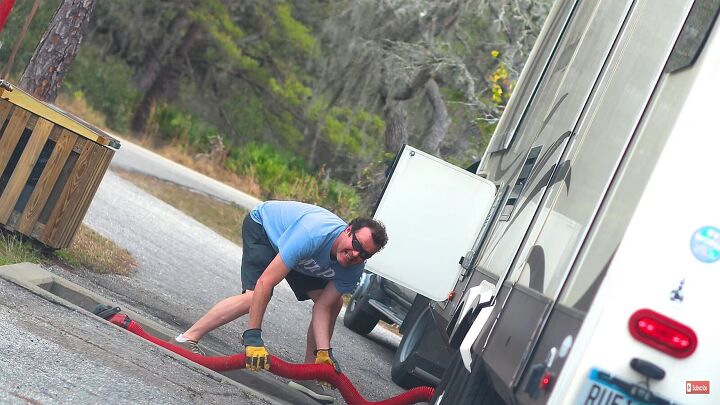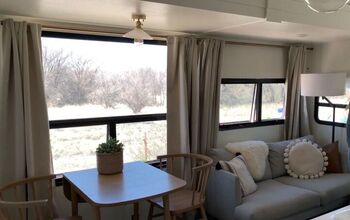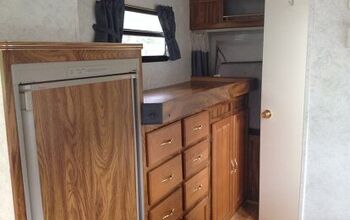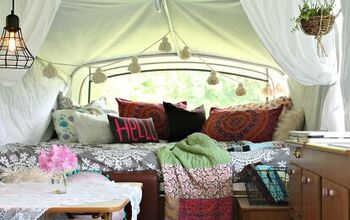6 Questions to Answer Before Living in an RV Full-Time

We have been living in an RV full time for a while now, and it can be hard at times. This is why we have decided to share our experience. These are six questions you should ask yourself before you decide to move into an RV to make sure that you are ready for this unusual lifestyle.
1. Are you ready to deal with the technical aspects of permanent RV living?
Managing the sewer hose is a big one, and it can be pretty unpleasant. There are also other aspects, such as the water hookup, electrical connection, raising and lowering the jacks, making sure your RV is level, and a lot of other potential things, depending on what kind of RV you have.
These are things you don't have to think about when you live in a regular house. Take the time to analyze if RV living is worth it for you in this sense.
2. Can you handle living in a smaller space?
The space you will have in an RV is much smaller than what you're used to in your current house or apartment: you might be going from a 2000-3000 square foot home to a 200-300 square foot RV. Most RVs do not offer a lot of privacy, which can be hard, especially for families with children.
Make sure you are ready to live in a smaller space with the people in your family. Indeed, we believe it is worth it, and we occasionally have guests in our RV, but this is definitely something to consider.
3. Can you handle having fewer amenities?
Living in an RV usually means there is no dishwasher, no full-time oven, and normally no washer and dryer. We had to adapt to plenty of things, such as using a convection oven instead of a regular one.
Our RV is relatively big and we are fortunate enough to have a washer and dryer, but most people would use laundromats, which many campsites, but not all of them, offer. The same goes for showers.
4. Are you okay with being really close to your neighbors?
We had a couple with a young child next to us for the last month, and we could hear her running around in the RV. We can also hear conversations held outside. Noises are definitely something to consider, both in regard to neighbors and natural noises, such as the rain.
When it is raining, it is nearly impossible to watch a movie, because you would not hear a thing. Sometimes it rains so hard that we cannot hear each other speak.
On the other side of that, are you willing to be without any neighbors? If you are wild camping in a beautiful area, you could be out there all by yourself. That might feel kind of lonely, especially if you are doing it completely alone, and not as a couple.
And even couples and families often prefer to be around other people, so take that into consideration. How close do you want to be to people? If you are not having any interaction with other people, is that going to bother you?
Another aspect of being out there by yourself is security. Are you willing to be out there all by yourself? Will you feel safe? Many people do it without encountering any issues, but it is still important to ask yourself that.
5. Can you handle being away from your friends and family?
This is probably the biggest question you need to ask yourself. Many times while traveling, you will have to go a while without seeing your friends and family. For us this has not been an issue: we do come home eventually and see them.
Until then, we stay in touch on a daily basis via social media, phone calls, or texts. Other people might have a harder time maintaining their relationships from afar, so do consider this. We do believe that this is something you can work out, and really just depends on how you plan to RV and where you are going.
6. Can you handle the judgment?
Long-term RV living is a unique lifestyle, and many people do not understand it. Many say, “When are you coming home and getting a real job?” And we don't want to come home and get a real job.
It is important to understand that this lifestyle is a choice. We could choose to have a house or an apartment. Some people, however, see living in an RV as being homeless. This is why we are trying to actually show people that it is possible for “normal people” to do this.
Living in an RV is a huge growing trend. People are doing it with their families, with young kids, and pets. Contrary to popular belief, RVs are not just for the retired. It is amazing how many young people we see on these campgrounds.
The community is getting younger and younger, and it is truly inspiring. With the age of technology now and how connected we are, there are so many jobs that can now be done online, and you do not have to be tied to one location.
If you do not have an RV yet, our tip is to rent one, take it out for at least a week or two weeks and experiment with it. Before you invest a lot of money in an RV, try to pretend that you are actually living in the rented one, so you can understand if this is a lifestyle that suits you.
We have been told that you either love it or hate it, and we have definitely loved it from the beginning.
Living in an RV full-time
These are our tips for RV living for beginners. Make sure you ask yourself these questions, and we are sure this is going to be a magical experience. Which sides of RV living appeal the most to you? Which ones might be a bit scary? Leave a comment below.





















Comments
Join the conversation
You left off the cost! My sister and her husband spend their Jan. through April months here in Florida. The cost to rent in a community of other trailers and RV's is often $1,000 a month or higher. Traveling daily towing a RV is also hard on the RV and the maintenance is ongoing just like a home. So don't think of this as a cheap lifestyle!
I have often wished I moved into a RV when I was young. Now, as a Senior who has back issues, it really isn't an option for me. I'm glad to hear that more young adults are taking up this lifestyle.